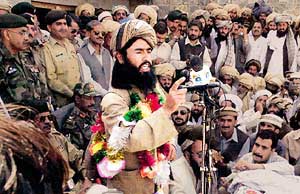|
|
|
Nek Mohammed, the former leader of the Taliban in South Waziristan, speaks to his followers after being showered with gifts by the Pakistani Army after a peace agreement on April 24, 2004. Nek was later killed in a US Predator strike, and was replaced by Baitullah Mehsud, who was killed in another Predator strike on Aug. 5, 2009. AFP Photo. |
McClatchy has a must-read article on the long-lasting negative effects of the “peace agreements” the Pakistani Army has cut with the Taliban during prior operations. The Mehsud tribesmen who were interviewed for the article expressed “deep, corrosive cynicism” about the sincerity of the military and the Inter-Service Intelligence agency and their relationship with the Taliban. Many are convinced a new peace agreement will be signed and that the government conducts the operations to siphon aid dollars from the US. Here are some select quotes:
“The government has used the people like toilet paper, used them and thrown them away,” thundered the spiritual leader and founder of the anti-Taliban Mehsud militia, Maulvi Sher Mohammad, in an interview.
…
“We cannot fight alongside the army because my people do not yet know whether the army and the Taliban are friends or enemies,” said Mohammad. “When we see the army crush them (the Taliban ), then we’ll believe.”
…
Mehsuds remember bitterly how in 2005, following such a deal, a Pakistani army general literally embraced the then- Taliban chief Baitullah Mehsud, and called him “a soldier of peace.” A U.S. missile strike killed the militant leader in August.
…
“This fight (in South Waziristan ) is for American dollars. The government always has some deal with the Taliban . It is ordinary people who suffer,” said student Zahidullah Mehsud, who thought he was around 19 years old, as he lined up at a registration center for those displaced by the operation. “This is all an ISI game.”
Couple this with the wholesale destruction of villages in South Waziristan and the denial of any civilian casualties, and the military and the government have a long way to go before winning any hearts and minds in South Waziristan.
Are you a dedicated reader of FDD's Long War Journal? Has our research benefitted you or your team over the years? Support our independent reporting and analysis today by considering a one-time or monthly donation. Thanks for reading! You can make a tax-deductible donation here.









2 Comments
Yeah….but I dont think they seem to have learnt lessons. Even now they think Haqqani’s as the strategic assets against US and LeT against India. This hatred that Pak Army is cultivating might consume Pak itself in the next 20-30 years
Based purely on public information about the terrain, the military operation and what we know of the insurgents, plus what the refugees are saying: the army has advanced a short distance into the Islamic emirate. They captured and then lost Hakeemullah’s home village and have not managed to get it back yet. The taliban are willing to stand and fight in at least some locations and the army is very loath to close and fight hand to hand. The army is shelling and strafing villages and compounds with abandon. Those places are mostly empty, so casualties on all sides are low. My guess is that until now the army has suffered more casualties than the taliban. That is because the individual talib soldiers are better trained and motivated than the army. The army has a huge edge in firepower but that is not enough to dislodge them from where they are prepared to stand and fight. The army’s hope is that massive use of artillery and airpower and a general show of force will convince the talibs to melt away rather than stand and fight. The taliban are willing to go along with that in many places, but are not willing to just withdraw from everywhere and allow the army to claim victory. At some point, the army will have to fight up close, at which point casualties will rise dramatically. To avoid that the army is willing to go slow and hope that the good taliban can convince the evil taliban not to be stubborn and to let the army have its way (in return the talibs get to stay alive and concentrate on Afghanistan). But the bad taliban are not willing to follow the script. THEIR hope is that their campaign of terrorism will cause the people of Pakistan to press the army to stop. What I cannot figure out is what is the army’s plan if they continue terrorism and DON’T melt away? Taking Waziristan ridge by ridge is not going to be a picnic. MAYBE the army is determined to do that if they have to, but I dont see convincing evidence of that as yet…I look forward to your report….